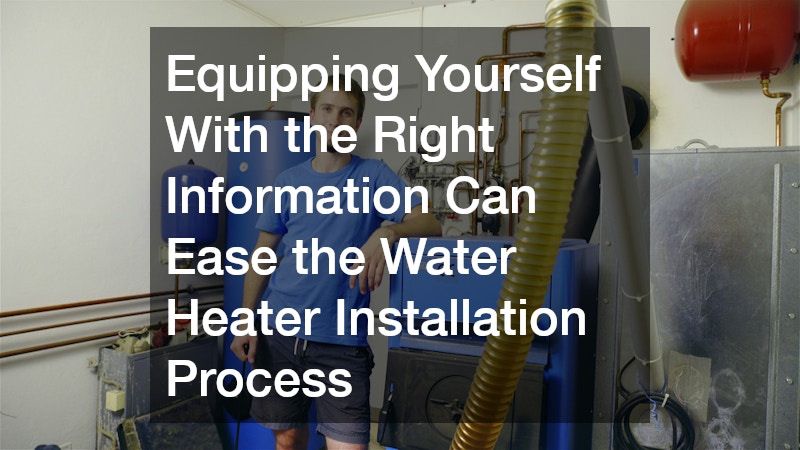3 Tips for a Smooth Water Heater Install

Installing a water heater can be a daunting task for homeowners. However, the process can be simplified with the right guidance and tips. This article explores essential questions and topics to ensure a successful installation of your water heater.
How do I choose the right type of water heater?
Understanding Different Types of Water Heaters
There are various types of water heaters available, each with its own advantages and shortcomings. Tankless water heaters are known for their energy efficiency and space-saving design but may struggle to provide hot water for large households.
Conventional tank water heaters, on the other hand, are easier to install and typically less expensive initially, but they consume more energy over time due to constant heating.
Solar water heaters are becoming increasingly popular for their eco-friendly benefits, but they require a significant upfront investment and sunny climate to operate efficiently. Understanding these types enables you to weigh the pros and cons associated with each system. This comprehension is crucial for making an informed decision tailored to your home’s specific needs.
When choosing the right type, consider the longevity and maintenance requirements of each system. For instance, tankless models often have longer lifespans and require less routine service compared to conventional tanks. Being well-versed with these details helps you anticipate future needs and maintenance costs effectively.
Factors to Consider When Selecting a Water Heater
Your household size is a primary factor when choosing a water heater, as larger households typically have higher hot water demands. Energy efficiency is another crucial consideration, impacting not only your environmental footprint but also your utility bills. A highly efficient system might seem more expensive initially, but it can lead to considerable savings over time.
Set a realistic budget for both the purchase and installation of your new water heater. Bear in mind that spending slightly more on a higher-quality, energy-efficient model can pay off in the long run. It’s also smart to consider possible future changes in your household size or hot water usage, ensuring your choice remains suitable over the years.
Research the longevity and warranty options for each type of water heater. Warranties can provide peace of mind by covering unexpected repairs or replacements. Aligning the product warranty with your expectations for durability and reliability ensures satisfaction with your investment.
What permits do I need for a water heater installation?
Navigating Local Building Codes
Understanding local building codes is pivotal in preventing legal issues and costly penalties. Regulations can vary significantly depending on your location, so it’s crucial to research or consult your local government’s building department. Adherence to these codes ensures a safe installation and can prevent future hazards or problems when selling your home.
Local building codes often address critical aspects such as proper venting, electrical connections, and placement. Each of these elements plays a role in the overall safety and functionality of your water heater. By ensuring compliance, you protect both your property and the wellbeing of its occupants.
Start by visiting your city or county’s official website where detailed code requirements are usually outlined. You might also find helpful resources such as diagrams and contact information for further inquiries. These initial steps lay the groundwork for a well-informed and compliant installation project.
The Permit Application Process
Securing the necessary permits involves a straightforward but vital process that can prevent unforeseen construction delays. Typically, you’ll start by filling out an application provided by your local government or municipal office. It’s important to provide accurate and complete information to expedite the approval process.
Include any supporting documentation or plans that outlines the proposed installation to avoid unnecessary setbacks. Some regions require inspections before and after installation, ensuring adherence to safety and code standards. Planning for these inspections ahead of time saves you from potential fines or required corrections post-installation.
It might be beneficial to consult a contractor during this process, as they are often familiar with the regulations and paperwork involved. They can guide you through intricate details and even manage the submission on your behalf. Partnering with knowledgeable personnel streamlines this bureaucratic aspect of your project.
How do I ensure my water heater is installed safely?
Safety Precautions During Installation
Safety precautions are vital for preventing accidents when installing a water heater, especially if you plan to handle any installation aspects personally. Begin with ensuring that you have the right tools and protective gear, such as gloves and safety glasses, to minimize the risk of injury. Always have another person present when handling heavy or cumbersome equipment.
Before installation, ensure all power supplies are turned off to avoid electrical shocks or accidents. Double-check that you have read and understood the manufacturer’s installation instructions comprehensively. By doing so, you reduce the risk of errors that could compromise safety and functionality.
Follow each installation step meticulously, proceeding with caution and verifying each connection point as you advance. This incremental approach helps prevent rushed mistakes, ensuring that your water heater operates safely once installed. If at any point you feel uncertain, don’t hesitate to seek professional assistance.
Equipping yourself with the right information and preparation can significantly ease the water heater installation process. By understanding the types of water heaters, permit requirements, and safety measures, you can ensure a smooth and successful installation. Armed with this knowledge, your journey to a functional and efficient home water heating system becomes less daunting and more rewarding.
.

 How to Choose the Right Home Remodeling Services for Your Project
How to Choose the Right Home Remodeling Services for Your Project  10 Ways Remodeling Improves Energy Efficiency and Comfort
10 Ways Remodeling Improves Energy Efficiency and Comfort  Most Common Causes of Roof Repair
Most Common Causes of Roof Repair  Affordable Skylight Services to Brighten Your Home Naturally
Affordable Skylight Services to Brighten Your Home Naturally  Tips for Selecting the Best Painting Contractors
Tips for Selecting the Best Painting Contractors  How a Home Remodeling Company Can Transform Your Entire Living Space
How a Home Remodeling Company Can Transform Your Entire Living Space  5 High Ceiling Accent Wall Ideas for a Modern Minimalist Living Room
5 High Ceiling Accent Wall Ideas for a Modern Minimalist Living Room  High Ceiling Living Room: The Ultimate Guide to Decorating & Designing
High Ceiling Living Room: The Ultimate Guide to Decorating & Designing  How to Choose the Perfect Kitchen Cabinets
How to Choose the Perfect Kitchen Cabinets